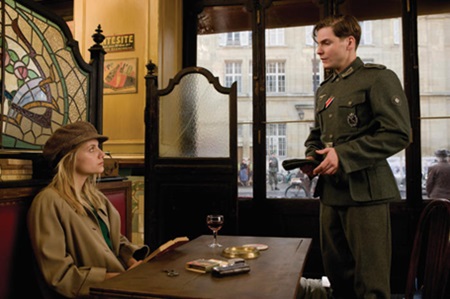We head back fifteen years today for the Quentin Tarantino written and directed World War Two era movie Inglourious Basterds (2009). The movie is set in Nazi-occupied France with two worlds of opposing forces conspiring to assassinate leaders of the inhabiting regime in an alternate history coming to pass at a Paris cinema. The movie was filmed in Germany and France.

The movie opens in 1941 with SS-Standartenführer Hans Landa of Austria interrogating farmer Perrier LaPadite of France with the suspicion of the Jewish Dreyfus family under the floorboards of LaPadite’s home. The farmer, choosing to spare his own family, acknowledges the hidden family. Landa has all but Shosanna Dreyfus shot, permitting the 18-year-old girl to run to safety. Landa, LaPadite and Dreyfus were portrayed by Christoph Waltz, Denis Ménochet and Mélanie Laurent, respectively.

Fast forward to 1944 when the movie introduces United States Army Lieutenant Aldo Raine, as portrayed by Brad Pitt, is shown recruiting Jewish–American soldiers for a special operations commando unit. The unit operates with the mission to create fear among Nazis by killing and scalping them while carving swastikas in the foreheads of permitted survivors among their audiences for the purpose of making the unit’s existence known among German armed forces functioning in France. The ‘Basterds’ unit in Inglourious Basterds included Sergeant Donny ‘The Bear Jew’ Donowitz, Private Smithson Utivich, Private Omar Ulmer, rogue German Sergeant Hugo Stiglitz and Austrian-born translator Corporal Wilhelm Wicki, portrayed respectively by Eli Roth, B.J. Novak, Omar Doom, Til Schweiger and Gedeon Burkhard.

As the above is occurring, German sniper Fredrick Zoller is set to star in a propaganda film Stolz der Nation (Nation’s Pride). Zoller, portrayed by Daniel Brühl, becomes infatuated with cinema operator Emmanuelle Mimieux, one and the same as survivor Shosanna Dreyfus from earlier in the film. Zoller convinces Nazi propaganda minister Joseph Goebbels, as portrayed by Sylvester Groth, to premier the propaganda movie at the theatre of Mimieux/Dreyfus. Shosanna conspires with lover and projectionist, Marcel, to kill the German leaders in attendance at the premier. Jacky Ido portrayed Marcel.

Michael Fassbender portrayed British commando Lieutenant Archie Hicox. Hicox has been recruited to infiltrate the premier, though an intervening step towards that end at a French tavern goes gruesomely wrong. The Basterds come to a compromise to keep the premier in play with undercover Allied agent and German film star Bridget von Hammersmark, with von Hammersmark being portrayed by Diane Kruger. Aldo Raine and the Basterds intend to proceed with the Hicox plan in the British commando’s place, despite the blown cover of the Brits and von Hammersmark. The especially satisfying and intriguing part of the plan, as well as the simultaneous plan of Shosanna Dreyfus and Marcel, is that Hans Landa has what should be sufficient suspicion of both avenues of plot against German leadership to take effective measures against them.

The resolution for many of the characters come to pass in that theatre, with some exceptions coming into play based on actions negotiated at the theatre. That the larger story is one of vengeance and violence in confronting a historic grievance in large part is the point of the film. Doing this with a sense of comeuppance for a duplicitous character central to this movie is particularly appreciated. I grant the movie Inglourious Basterds as directed and written by Quentin Tarantino 4.25-stars on a scale of one-to-five.
Matt – Wednesday, June 19, 2024








